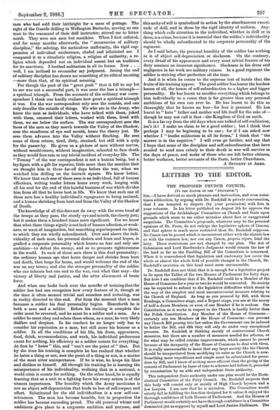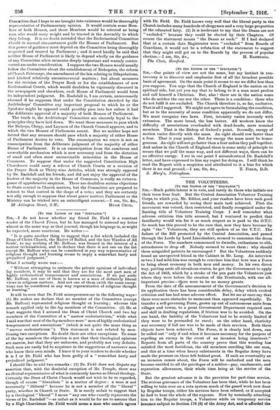LETTERS TO THE EDITOR.
THE PROPOSED CHURCH COUNCIL. [To sea EDITOR or TRH " srEcuroa."1 Srs,—I have derived so much pleasure and instruction, and even some. times edification, by arguing with Dr. Rashdall in private conversation, that I am tempted to dispute (by your permission) with him in your columns. In his letter published on August 5th ho opposes the suggestions of the Archbishops' Committee on Church and State upon grounds which seem to me either mistakes about fact or exaggerated suspicions. The Committee's proposals, whatever may be the personal opinions of Dr. Frere, do not enlarge the legislative sphere of Canons, and that sphere is much more restricted than Dr. Rashdall supposes. No Canon can be passed which is inconsistent either with the statute law or with the common law, nor can any Canon, proprio vigore, bind the laity. These restrictions are not changed by our plan. The Act of Submission and Lord Hardwicke's Judgment would remain the law of the land so far as the Enabling Bill of the Committee is concerned. When it is remembered that legislation and customary law cover the whole or almost the whole field of possible changed in the Church, Dr. Rashdall's anxieties on this head must seem unreasonable.
Dr. Rashdall does not think that it is enough for a legislative project
to lie upon the Tables of the two Houses of Parliament for forty days. But here I am confident that if Dr. Rashdall could be a Member of the House of Commons for a year or two he would be converted. No society can be expected to submit to the legislative difficulties which stand in the way of the simplest and most uncontroversial measure relating to the Church of England. As long as you proceed by Bill, with throe Readings, a Committee stage, and a Report stage, you are at the mercy of half-a-dozen Members, or even of one Member if he is zealous. Our Constitution as it works in respect to the Church is hardly bettor than the Polish Constitution. Any Member of the House of Commons— certainly any ten Members of the House of Commons—can prevent any Church Bill passing into law unless the Government can be induced to father the Bill, and this they will only do under very exceptional pressure. Dr. Rashdall I. thinking mainly of controversial Church measures, but there are a number of measures needed for reforms, or for what may be called routine improvements, which cannot be passed because of the incapacity of the House of Commons to deal with them. It is really unreasonable to insist that any large society like the Church should be incapacitated from modifying its rules as the Church is now. Something more expeditious and simple must be substituted for proce- dure by Bill, and I know of nothing more efficient than the giving of the consent of Parliament by lapse of time to schemes laid before it, preceded by examination by an able and independent State authority.
This independent State authority under our plan would be the Eccle- siastical Committee of the Privy Council. Dr. Rashdall suspects that this body will consist only or mainly of High Church laymen and a few lawyers. I am sure that ho is mistaken. The Committee would utterly fail in fulfilling the function designed for it unless it enjoyed the thorough confidence of both Houses of Parliament. And the Houses of Parliament would certainly not have thorough confidence in a Committee dominated (let us suppose) by myself and Lord Justice Phillimore. The
Committee that I hope to see brought into existence would be thoroughly representative of Parliamentary opinion. It would contain some Mem- bers of both Houses, and those Members would be selected as being men who would carry weight and be trusted in the Assembly to which they belong. It is no doubt intended that the Ecclesiastical Committee should in normal circumstances guide the Houses of Parliament. But this power of guidance must depend on the Committee being thoroughly respected and trusted by Parliament ; and it need hardly be said that neither House of Parliament is likely to depend wholly on the guidance of any Committee when measures deeply important and warmly contro- verted are under consideration. I suppose the two Houses would usually follow tho Committee about the establishment of Bishoprics, the reform of Church Patronage, the amendment of the laW relating to Dilapidations, and kindred relatively uncontroversial matters ; but about measures for the revision of the Prayer Book or for the establishment of new Ecclesiastical Courts, which would doubtless be vigorously discussed in the newspapers and elsewhere, each House of Parliament would form its independent judgment. Dr. Rashdall is, I am certain, unnecessarily alarmed if ho supposes that under the Constitution sketched by the Archbishops' Committee any important proposal to which ho or the S peel 21or might be opposed could possibly pass into law unless it had the deliberate approval of a majority of both Houses of Parliament.
The truth is, the Archbishops' Committee are sincerely loyal to the principles they have laid down. We want those measures to pass which the Bishops, Clergy, and Laymen of the Church Council approve, and to which the two Houses of Parliament assent. But we neither hope nor intend that any measure should pass which a majority of either House of Parliament desires to veto. The emancipation wo crave is not an emancipation from the deliberate judgment of the majority of either House of Parliament. It is an emancipation from the cumbrous and unworkable mechanism which is now necessary and from the dictation of small and often most unreasonable minorities in the House of Commons. To suppose that under the suggested Constitution High Churchmen could carry a reform of Church Courts or a revision of the Prayer Book or Thirty-nine Articles, which was strongly opposed by Dr. Rashdall and his friends, and did not enjoy the approval of the leaders of the majority in the House of Commons, is really an extrava- gance of apprehensive suspicion. There are doubtless serious objections to State control in Church matters, but the Committee are prepared to submit to that control in the shape of a veto ; and they are certainly not silly enough to suppose that about grave matters Parliament or the Ministry can be tricked into an unintelligent consent.—I am, Sir, &o.,































 Previous page
Previous page